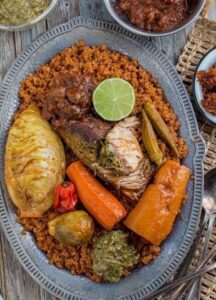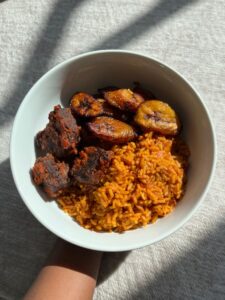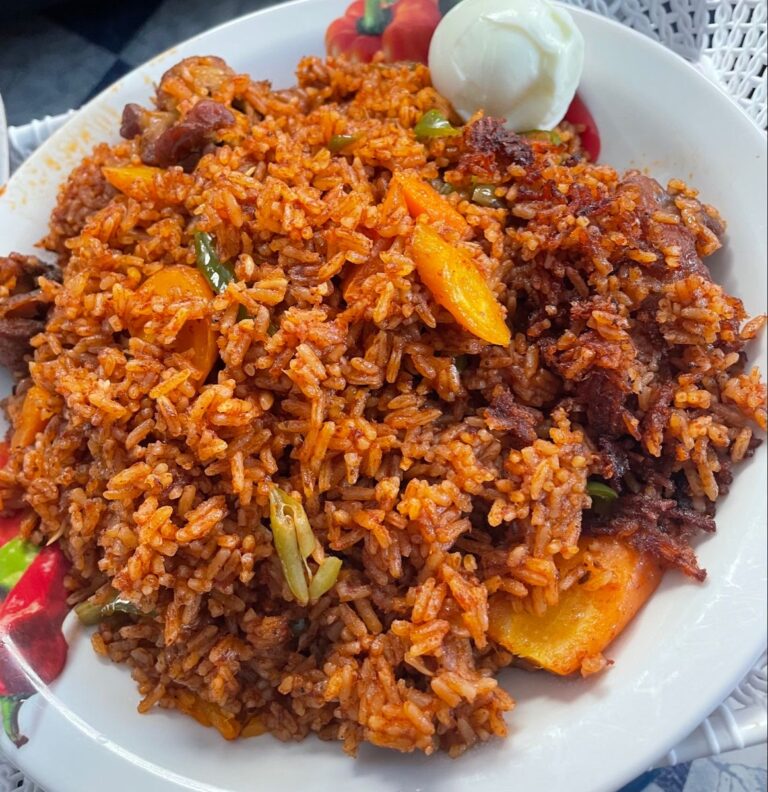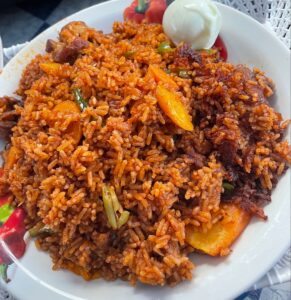Many people think Jollof rice originated from Nigeria or Ghana because of the constant banter about which country has the best Jollof rice. Well, sorry to burst your bubble, but Jollof rice did not originate from either of these countries. This beloved West African dish has a rich history that transcends national boundaries, tracing back to the Senegambia region, particularly Senegal.
The Origin of Jollof Rice
Jollof rice, also known as “Benachin” (meaning “one pot” in the Wolof language), has its roots in the ancient Wolof Empire, situated in parts of present-day Senegal, Gambia, and Mauritania. The dish, originally called “thieboudienne” in Senegal, combines rice, fish, tomatoes, and a variety of vegetables. It began as a simple yet nutritious meal that could be easily cooked in one pot.
Unique Jollof Styles Across Africa
1. Senegal
In Senegal, the birthplace of Jollof rice, people know the dish as “thieboudienne.” Traditionally, it’s prepared with fresh fish, broken rice, and an assortment of vegetables such as carrots, cabbage, and cassava. The use of fermented fish adds a distinct umami flavor, making Senegalese Jollof rice a unique culinary experience.

2. Nigeria
Nigerian Jollof rice is perhaps the most well-known variant, celebrated for its rich, spicy flavor. It typically features long-grain parboiled rice, tomatoes, onions, and a blend of spices including thyme, curry powder, and Scotch bonnet peppers. Nigerians often serve Jollof with fried plantains, grilled chicken, or beef.

3. Ghana
Ghanaian Jollof rice is another popular variant, noted for its slightly different seasoning blend. Ghanaians use basmati rice or long-grain rice, and their version tends to have a smoky flavor due to the cooking method that allows the bottom layer of rice to slightly char, creating what is known as “kanzo.” They use spices like ginger, garlic, and a generous amount of tomatoes and onions.
4. Sierra Leone
In Sierra Leone, Jollof rice often includes a combination of meat and vegetables, with chicken, beef, or goat. The rice cooks with a tomato-based sauce that includes bell peppers, onions, and local spices. The Sierra Leonean version is known for its hearty, comforting flavors and is typically served with a side of salad or fried plantains.
Is Jollof Rice Eaten Outside Africa?
Yes, Jollof rice has made its way beyond African borders and is enjoyed in various parts of the world. In the United States, the United Kingdom, and other countries with significant African diaspora communities, Jollof rice is a popular dish at African restaurants and cultural festivals. It’s not uncommon to find Jollof rice on the menu at international food fairs and events, celebrated for its rich flavors and cultural significance.
Interesting Facts About Jollof Rice Outside Africa
Adaptation and Fusion: In many Western countries, chefs adapt Jollof rice to include locally available ingredients. For instance, you might find Jollof rice prepared with smoked turkey or shrimp, adding a unique twist to the traditional recipe.
Cultural Festivals: Jollof rice competitions are a highlight at many African cultural festivals held abroad. These events bring together people from different backgrounds to celebrate the dish, often leading to friendly rivalries between supporters of Nigerian and Ghanaian Jollof.
Celebrity Endorsements: Jollof rice has gained popularity among celebrities and food enthusiasts. Notable figures like Nigerian-American singer Jidenna and British chef Jamie Oliver have expressed their love for Jollof rice, further boosting its international recognition.
Cultural Festivals: Jollof rice competitions are a highlight at many African cultural festivals held abroad. These events bring together people from different backgrounds to celebrate the dish, often leading to friendly rivalries between supporters of Nigerian and Ghanaian Jollof.
Cookbooks and Cooking Shows: Jollof rice has been featured in numerous cookbooks and cooking shows, helping to introduce it to a wider audience. Recipes and cooking tips for Jollof rice are readily available online, making it easier for people around the world to try their hand at making this delicious dish.
By exploring the rich history and diverse preparations of Jollof rice, we appreciate not only the culinary art but also the cultural significance it holds across West Africa and beyond. So, next time you enjoy a plate of Jollof, remember its journey from the heart of the Wolof Empire to your table.
Conclusion
Jollof rice is more than just a meal; it’s a cultural symbol that unites West Africans and delights food lovers globally. From its origins in Senegal to its adaptations in Nigeria, Ghana, and Sierra Leone, Jollof rice continues to evolve, bringing joy and flavor to every table it graces. Whether you’re enjoying it at a local restaurant in Lagos or at a food festival in London, Jollof rice remains a beloved dish that transcends borders and celebrates the rich culinary heritage of West Africa.








